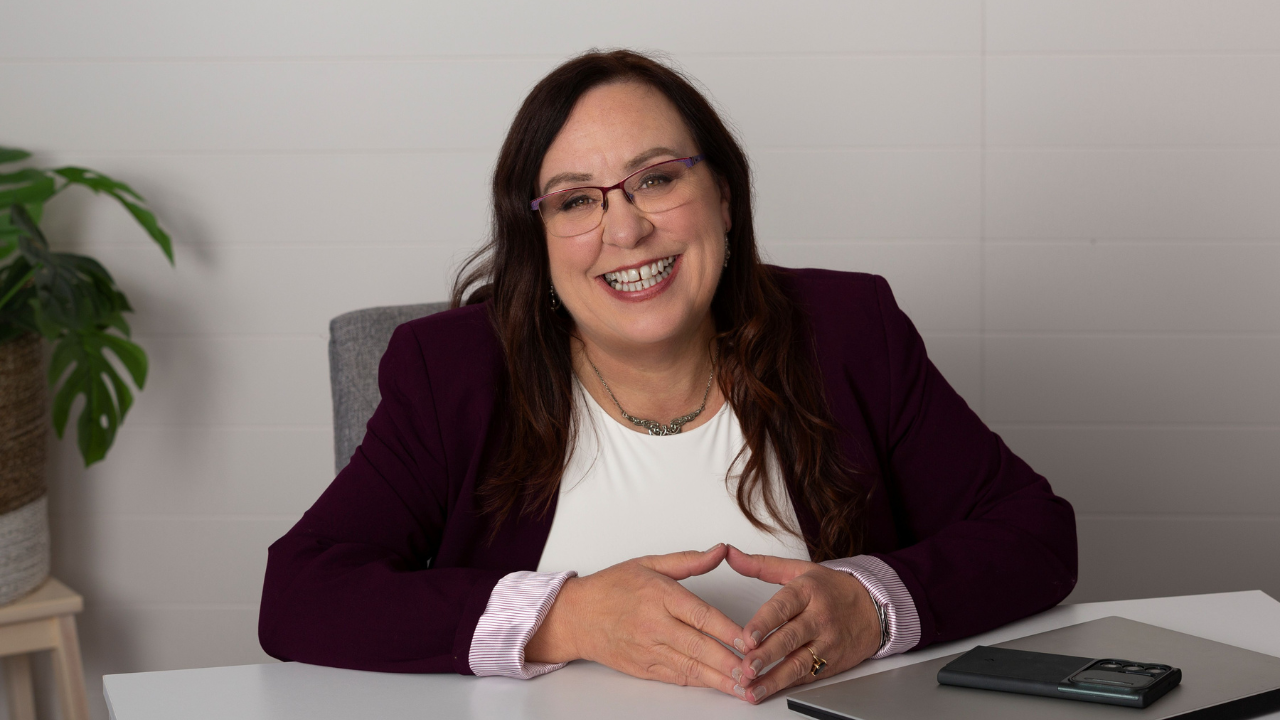The Authority Gap

When Accomplished Women Leaders Stop Proving and Start Embodying
You're in another December planning meeting. You've spent the year delivering results—exceeding targets, leading initiatives, solving problems no one else could crack. And yet here you are, again, front-loading your recommendation with three slides of supporting data before you even get to your actual point.
Because last time you didn't, someone asked, "But what's this based on?"
As if your fifteen-plus years of experience and proven track record aren't basis enough.
Here's the truth nobody's saying out loud: You've spent another year proving yourself. And they're still asking for receipts.
Every presentation becomes an audition. Every meeting becomes a defense. Every win requires a victory lap complete with documentation, testimonials, and a PowerPoint deck explaining why it matters.
You're exhausted from constantly validating your right to do the work, and wondering how to be recognized at work without another performance.
And here's what I know that you might not have named yet: The problem isn't your credibility. The problem is you're still treating your authority like something up for debate.
Your Expertise Is Already Established. Why Are You Still Auditioning?
Let me paint you a picture you'll recognize:
You walk into a room with a solution. Not a theory—a solution. You've already done the analysis, consulted the data, and mapped the implications. You know this is the right call because you've made this call successfully a dozen times before.
But instead of stating your recommendation clearly and moving forward, you find yourself saying:
"I was thinking maybe we could consider..." "This might be wrong, but what if we..." "I'm not sure if this is the best approach, but..."
You hedge. You soften. You pre-apologize for taking up space with your expertise.
And then—because the universe has a dark sense of humor—some guy who started last quarter restates your exact idea with declarative confidence, and suddenly it's brilliant.
Sound familiar, Brave One?
This is the authority gap. Not the one between you and your male colleagues—though that exists too. I'm talking about the gap between the expertise you possess and the authority you're actually claiming.
The Authority Gap Women Face (And Why "Leaning In" Made It Worse)
Here's the research that'll make your blood boil: Research consistently shows women face a credibility gap—we're interrupted more frequently in meetings, our ideas are more likely to be attributed to male colleagues who repeat them, and we need to provide more evidence to be taken seriously.
And here's what those studies don't tell you—and what nobody in the "lean in harder" crowd wants to admit:
The more you prove, the more you reinforce the dynamic that your authority is conditional.
Every time you over-explain, you're teaching people that your ideas need defending. Every time you provide unrequested evidence, you're signaling that your expertise is debatable. Every time you soften your language to make your brilliance more palatable, you're asking for permission to be taken seriously.
And permission-seeking and authority cannot coexist.
I know what you're thinking: "But Amanda, if I don't provide the evidence, they won't listen." And you're partially right. The game is rigged. The standards are different. The competence trap is real.
But playing by rules designed to keep you proving forever isn't a strategy. It's exhaustion dressed up as professionalism.
The real authority gap isn't between you and men. It's between how you see your expertise (negotiable, conditional, requiring constant re-validation) and how you need to start presenting it (established, authoritative, non-negotiable).
Every time you over-explain, you're teaching people that your ideas need defending.
Authority Isn't Built. It's Claimed.
Here's where most leadership advice misses the mark:
They'll tell you that you need to learn how to build authority through personal branding and executive presence. But that's still proving. And look, those tactics sometimes might get you noticed. But they're still playing the proving game with better marketing.
You're still performing your qualifications. Just on a bigger stage.
Here's the truth that changes everything: You cannot "earn" your way into authority. Authority is a decision, not a destination.
You already ARE the expert. The question isn't whether you're qualified—the question is when you're going to start acting like it.
Think about the last time someone with half your experience stated an opinion as fact in a meeting, and everyone nodded along. They didn't earn that reception. They claimed it.
They said "Here's what we're doing" instead of "What if we considered..." They said "This is the right approach" instead of "I think maybe we should..." They made declarative statements instead of tentative suggestions.
The difference wasn't their expertise. It was their relationship to their expertise.
And here's the part that might sting: When you constantly hedge, qualify, and pre-apologize, you're not being humble or collaborative. You're being complicit in your own diminishment.
I'm not saying this to make you feel bad. I'm saying it because this isn't imposter syndrome—it's systemic conditioning. And you can't dismantle what you won't name.
The moment you stop seeking permission to be taken seriously is the moment you become impossible to dismiss.
From Performance to Presence: The Authority Embodiment Shift
So what does this actually look like in practice? How do you stop proving and start embodying?
First, let's be clear about what this isn't: This isn't about "faking it till you make it." You're not faking anything—you already have the expertise. This isn't about power posing in the bathroom before meetings or developing a more commanding vocal tone. Those are still performance tactics.
This is about energetic alignment with what you already know to be true.
Here's the framework:
- Stop Translating Your Expertise Into "Acceptable" Language
Every time you soften your statement, add a qualifier, or hedge your recommendation, you're translating your actual expertise into a more palatable version. You're making your authority negotiable.
Instead of: "I was thinking we might want to consider pivoting the Q1 strategy..." Try: "We're pivoting the Q1 strategy. Here's why."
The second version isn't arrogant. It's authoritative. And if you're uncomfortable with the difference, that discomfort is the work.
- Claim Your Expert Position Explicitly
Stop waiting for someone to grant you the title of expert. You've earned it. Now use it.
Instead of: "In my experience..." or "From what I've seen..." Try: "Here's what the data shows..." or "This is how this works..."
Remove the personal qualifiers. State the facts. Let your expertise speak for itself without the apologetic frame.
- Let Your Presence Do The Heavy Lifting
Authority is felt before it's proven. When you walk into a room, certain of your value, people feel it. When you speak with the quiet confidence of someone who knows their recommendations are sound, people respond differently.
This isn't about being louder or more aggressive. It's about being fully present in your expertise without apology.
Your expertise isn't on trial. Stop building your case.
The December Meeting That Changed Everything
I worked with a senior director at a fintech company, for privacy reasons, let's call her Rachel. Fifteen years of experience. Multiple successful product launches. Consistently a top performer.
And in every leadership meeting, she'd start her recommendations with a five-minute preamble of supporting data, market research, and disclaimers about potential edge cases.
She was performing her qualifications. Every single time.
One day, after we'd been working together for a few months, she walked into a strategy meeting differently. The CFO asked her opinion on a potential acquisition.
She paused. Then she said, "We shouldn't do this deal. The integration costs will exceed the projected value by year two, and it pulls resources from our core product development at a critical growth phase."
No preamble. No data dump. No "I could be wrong, but..."
Just her expert assessment, stated clearly.
The room went silent. Then the CEO said, "Okay. What's our alternative?"
That was it. No pushback. No requests for additional evidence. No one questioned her analysis.
What changed wasn't her expertise or her experience. It was her energetic relationship to both.
She stopped asking permission to be taken seriously. And the moment she did, everyone else stopped questioning whether she should be.
I remember the first time I stopped explaining my rates to potential clients. The silence after I stated my fee felt deafening. Every instinct screamed at me to fill it with justifications, credentials, explanations of value.
I didn't.
The client said yes without negotiation.
Authority creates its own evidence.
What Becomes Possible
Imagine what shifts when you stop performing your qualifications:
Meetings where your word carries weight without requiring a supporting deck. Decisions that don't need defending. Recommendations that are implemented because you made them, not because you convinced everyone with seventeen data points.
The energy you reclaim when you're no longer constantly validating your right to lead. The mental space that opens up when you stop pre-defending every idea. The executive presence that naturally emerges when you're no longer auditioning.
Here's what I want you to consider as you head into year-end planning and 2026 goal-setting:
You can spend another year still proving. Collecting more credentials. Gathering more evidence. Over-delivering and under-claiming. Building a case for authority you already possess.
Or you can make a different choice.
You can step into the authority you've already earned and watch how quickly everything shifts when you stop treating your expertise like it's up for debate.
This post scratches the surface. The real work—the identity-level shift from performer to embodied leader—requires deeper excavation than a blog post can provide.
It means examining where you learned that your authority is conditional. Dismantling the internal narrative that says your expertise must be continually re-earned. Practicing the discomfort of stating what you know without apology or qualification.
It means learning to hold your ground when someone questions you, not with more evidence, but with the quiet certainty that comes from knowing your expertise doesn't require their validation.
Ready to stop auditioning and start embodying?
Let's talk about what authority actually looks like when you stop seeking permission for it. Book a Strategy Call and we'll map exactly where you're still proving and how to shift it.
Because here's what I know: Your expertise isn't the question. Your willingness to claim it is.
The work begins the moment you decide your authority isn't negotiable.
Are you ready?
Inbox clutter is exhausting. This isn’t that.
If you’re a high-achieving woman who’s done with leadership models that drain you—this is where it shifts.
You’ll get a monthly leadership newsletter, the occasional insider-only invite, and bold insights that actually move the needle.
Built for women who don’t have time to waste—and don’t want to.
We hate SPAM. We will never sell your information, for any reason.



